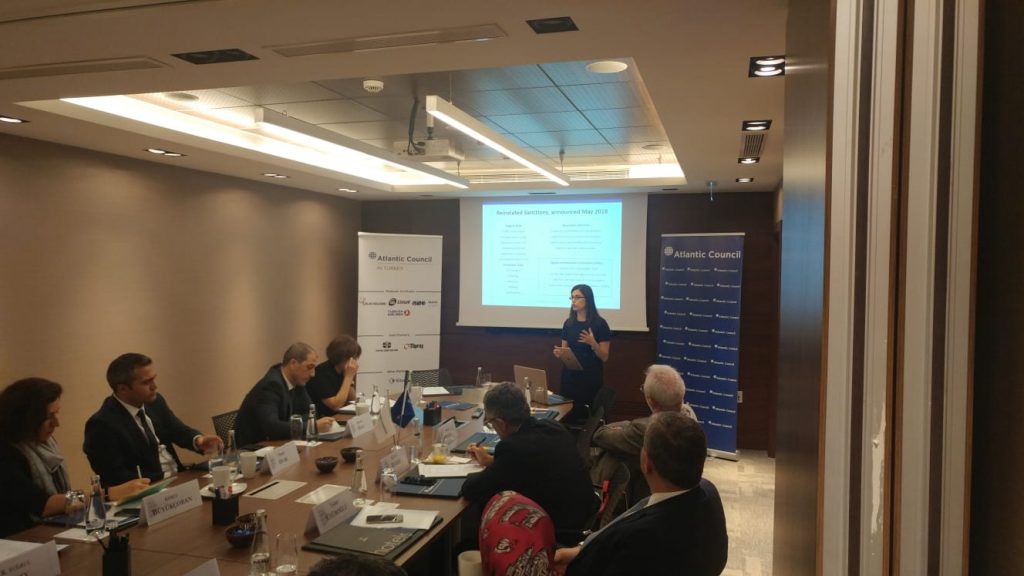On Tuesday, November 27, in Istanbul, the Atlantic Council IN TURKEY hosted Atlantic Council Global Energy Center Nonresident Senior Fellow Ellen R. Wald for a talk entitled “Iran Sanctions, OPEC and Trump: Where Are Oil Markets Moving?” to a roundtable that featured a discussion about the likely impact of the new U.S. sanctions on Iran and the future of economic engagement with Iran.
Dr. Wald summarized the two sets of sanctions. One set went into effect in August 2018 and the second went into effect in November 2018. Of particular note are sanctions on investment in Iranian oil and gas fields, shipping, insurance, tankers, sales of over $1 million worth of gasoline to Iran and any equipment which would help Iran make or export gasoline.
At the last minute before the sanctions came into effect, the U.S. announced that eight countries would receive Significant Reduction Exemptions (SREs). These countries include: China, South Korea, India, Japan, Taiwan, Turkey, Italy and Greece. According to the U.S. government, payment for oil and condensates must be put into an escrow account within the customer country that Iran can only use for bilateral trade. The SREs are reviewable after 180 days. The Trump standards differ significantly from the Obama standards, which applied an 18% reduction formula to all. The Trump administration appears not to use any standard when determining which countries get SREs and how much oil the SRE allows them to import. This makes the SREs a potentially important bargaining tool for President Trump in future trade negotiations with these countries.
The most recent data on Iran’s oil exports indicates that the sanctions are impacting Iran’s total oil exports. According to TankerTrackers.com, Iran’s current exports are down to 1.47 million barrels per day. This is down from 1.63 million barrels per day in October. However, they have observed some non-Iranian owned tankers approaching Iranian ports. These tankers could begin loading oil for countries that have received SREs. Notably, the United States eliminated the condensate loophole that allowed importers to reduce their imports of Iranian oil but continue to import as much Iranian condensate as they wanted.
Between May and September, oil prices rose, in part due to fears of a growing oil shortage based on rhetoric from the Trump administration that no exemptions would be given for Iranian oil. This changed when the Trump administration announced the SREs. Combined with significantly higher oil production from Saudi Arabia and the United States, oil prices fell a great deal in October and November. Lower oil prices frustrate Iran because it must offer significant discounts to its customers and importers are less likely to seek out illicit purchases of Iranian oil when oil prices are lower globally. It also reduces Iran’s revenue because the sanctions limit Iran’s exports whereas other producers can increase exports.
President Trump is seeking to keep oil prices low to satisfy American consumers and promote American manufacturing. However, lower oil prices are detrimental to the U.S. fracking industry. This does not appear to be a significant concern for the Trump administration and President Trump seems focused on lower oil prices without regard to the effect on the U.S. shale oil industry.
The sanctions are already impacting the Iranian economy, which was suffering a great deal even before sanctions were announced. Iran’s oil industry is in trouble and production is already starting to decline. Iranians of all stripes have taken to protesting delayed payments, currency devaluations, a lack of foreign currency, poor water quality and restrictions on women. Although the protests are ongoing and have been, at time, widespread, they do not likely signal impending regime change. The U.S. sanctions strengthen the Iranian regime’s line that outside forces are trying to undermine Iran, but are putting significant pressure on the Iranian regime’s ability to fund its economy and its military activities.
Dr. Ellen R. Wald is a Nonresident Senior Fellow at the Atlantic Council’s Global Energy Center. Follow her on Twitter @EnergzdEconomy
